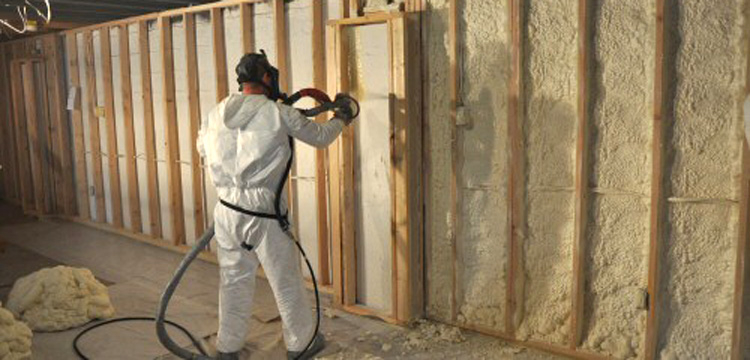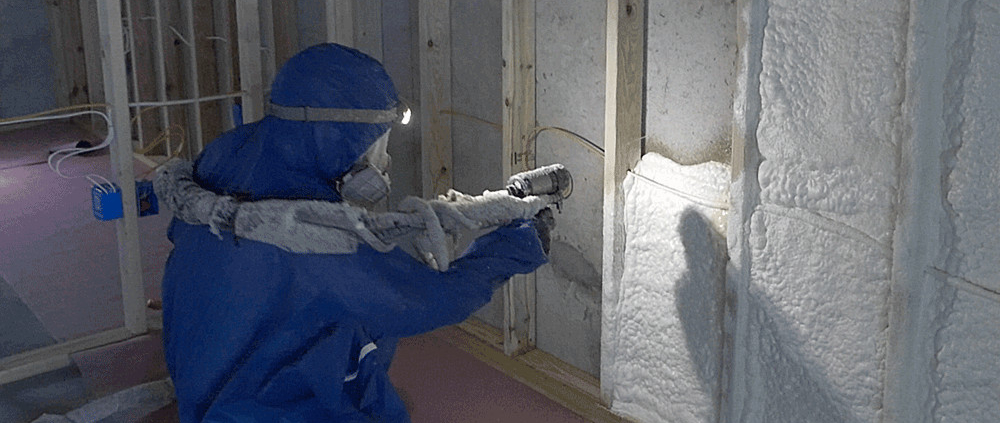The Ultimate Guide to Choosing Open Cell Spray Foam for Your Basement
Choosing open cell spray foam for a basement is a strategic decision that works well, but only under specific conditions. Unlike its denser counterpart, closed cell foam, open cell is vapor-permeable, meaning it allows moisture to pass through it. This can be an advantage in a properly managed basement, as it allows foundation walls to dry to the inside should any moisture find its way in. However, it also means open cell foam is not a good choice for basements with existing water leakage or high humidity problems. The key to successfully using open cell foam below grade is to ensure the basement is completely waterproofed from the exterior before insulation is installed.
This guide will provide a detailed look at the pros, cons, and critical considerations before hiring an expert spray foam insulation company for your basement. Drawing on extensive field experience from insulation professionals, it will help homeowners understand when this material is the right choice and what steps are necessary to ensure a successful, long-lasting installation.
Understanding Open Cell Spray Foam
Open cell spray foam is a type of polyurethane foam insulation with a cell structure that is not completely closed. Think of it like a very dense sponge. This structure gives it several distinct properties:
- Flexibility: It remains soft and pliable after curing.
- Air Sealing: It expands significantly upon application (up to 100 times its liquid volume), allowing it to fill every crack and crevice, creating an excellent air barrier.
- Vapor Permeability: It allows water vapor to pass through it, meaning it can get wet and will need to dry out.
- Sound Dampening: Its soft texture is very effective at absorbing sound waves, making it a great choice for reducing noise.
Moisture Management: The Critical Factor
The single most important consideration when using open cell foam in a basement is moisture. Basements are inherently prone to moisture issues, both from bulk water leaks and from water vapor moving through the concrete foundation from the surrounding soil.
Why Vapor Permeability Matters
Because open cell foam is vapor-permeable, it will not trap moisture against the foundation wall like a vapor barrier would. If a small amount of moisture gets behind the foam, it can pass through and dry out, which can help prevent mold and rot. This is often described as allowing the wall to “breathe.”
However, this same property is a major liability if the basement has any water leakage problems. Open cell foam will absorb liquid water like a sponge. If it becomes saturated from a leak, it loses all its insulating value and can hold a large amount of water against the framing and drywall, leading to serious damage.
Key Recommendation: Before even considering open cell foam, a homeowner should have their basement’s exterior foundation professionally waterproofed and confirm they have a reliable sump pump and drainage system. The basement must be proven to be dry year-round.
When Open Cell is a Good Choice for a Basement
In the right circumstances, open cell foam offers several compelling advantages for a basement project.
Cost-Effectiveness
Open cell foam generally has a lower material cost than closed cell foam. Because it also has a much higher expansion rate, less material is needed to fill a wall cavity, which can further reduce the overall project cost. This can make it an attractive option for homeowners on a budget, who are finishing a large basement space.
Superior Sound Control
If the basement is going to be used as a home theater, music room, or general living area, the sound-dampening qualities of open cell foam are a significant benefit. It can drastically reduce noise transfer between the basement and the floor above, creating a much quieter and more pleasant environment.
Complete Air Sealing
Like all spray foams, proper open cell spray foam installation has a high expansion rate of open cell ensures a near-perfect air seal. This stops drafts coming from the rim joists (the area where the foundation meets the wood framing of the house), which is a major source of energy loss in many homes.
Below, this image illustrates a proper open cell spray foam installation in a dry basement. !(A clean, dry basement with freshly installed open cell spray foam between the wall studs.)

When to Choose Closed Cell Foam Instead
While open cell foam offers many benefits, there are scenarios where closed cell foam is a safer and more appropriate choice for a basement.
If There Is Any Risk of Moisture
If a basement has a history of dampness, leaks, or even high humidity, closed cell foam is the better option. Its closed cell structure makes it waterproof and a true vapor barrier. It will not absorb water and can help to block moisture from entering the basement living space.
For a Higher R-Value in a Smaller Space
Closed cell foam has a much higher R-value per inch (around R-6.5 compared to R-3.5 for open cell). If wall cavities are shallow, or if the homeowner wants to achieve the highest possible insulation value, closed cell foam provides more insulating power in less space.
Here is a comparison for basement applications:
| Feature | Open Cell Spray Foam | Closed Cell Spray Foam |
|---|---|---|
| Moisture Handling | Allows drying, but absorbs bulk water | Blocks moisture, is waterproof |
| Primary Use Case | Dry, finish-ready basements | All basements, especially with any moisture risk |
| Cost | Lower | Higher |
| R-Value per Inch | ~3.5 | ~6.5 |
| Sound Dampening | Excellent | Good |
| Vapor Barrier | No (Permeable) | Yes (Impermeable) |
Things to Consider Before Making a Decision
- Assess Your Basement’s Water History: Be honest about your basement’s condition. Consider if it has ever had water, even a small amount, or if there is a musty smell. If the answer is yes, you should lean toward closed cell foam.
- Plan for a Complete System: Open cell foam should be part of a complete basement finishing system. This often includes an interior vapor retarder (like a specialized paint applied over the foam) and finished with drywall.
- Hire an Experienced Contractor: The success of this application depends heavily on the contractor’s knowledge. They should be able to explain the building science behind why they are recommending a certain product and be able to assess your basement’s specific needs.
Key Recommendation: In many cases, a hybrid approach offers the best of both worlds. A contractor can spray a thin layer of closed cell foam directly against the concrete foundation to act as a vapor barrier, and then fill the rest of the wall cavity with open cell foam to save money and gain sound-dampening benefits.

Questions People Ask About Basement Insulation
Below are answers to some common questions homeowners have about basement insulation, particularly regarding spray foam.
If open cell foam gets wet can it grow mold?
The foam itself is an inert plastic and does not support mold growth. However, if it gets wet and stays wet, it can hold moisture against organic materials like wood studs and paper-faced drywall, which can then grow mold. This is why it is so important that the basement remains dry.
Is open cell foam strong enough for a basement?
Open cell foam is not a structural product. It is soft and flexible and does not add any rigidity to the wall assembly. This is perfectly fine for an interior application where it is protected by drywall.
How do you finish a wall over open cell foam?
After the foam is sprayed and has expanded beyond the face of the studs, it is trimmed flush. This creates a flat surface for the drywall to be attached directly to the studs, just like in a standard wall.
Final Thoughts on Open Cell Foam in Basements
Choosing open cell spray foam for a basement is an advanced insulation strategy that can provide excellent performance and value when executed correctly. It is a cost-effective way to achieve a superior air seal and excellent sound control. However, its success is entirely dependent on having a verifiably dry basement. Homeowners must prioritize comprehensive waterproofing and drainage before considering it. For any basement with even a hint of a moisture problem, closed cell foam remains the safer and more reliable choice.
Get a Professional Basement Evaluation
Making the right insulation choice for a basement requires a careful, on-site assessment by a professional. For homeowners seeking an expert opinion, a detailed consultation from a reputable professional is invaluable. For instance, the team at All Foam & Insulation can provide a comprehensive assessment. They can be reached by email at joe@allphasew.com or by phone at (541) 826-9600.
Reviewer: Lily Johnson offered her feedback after reviewing this post. With 8 years in the spray foam insulation field, her suggestions centered around improving outreach to homeowners looking for quality insulation solutions.


Leave a Reply
Want to join the discussion?Feel free to contribute!